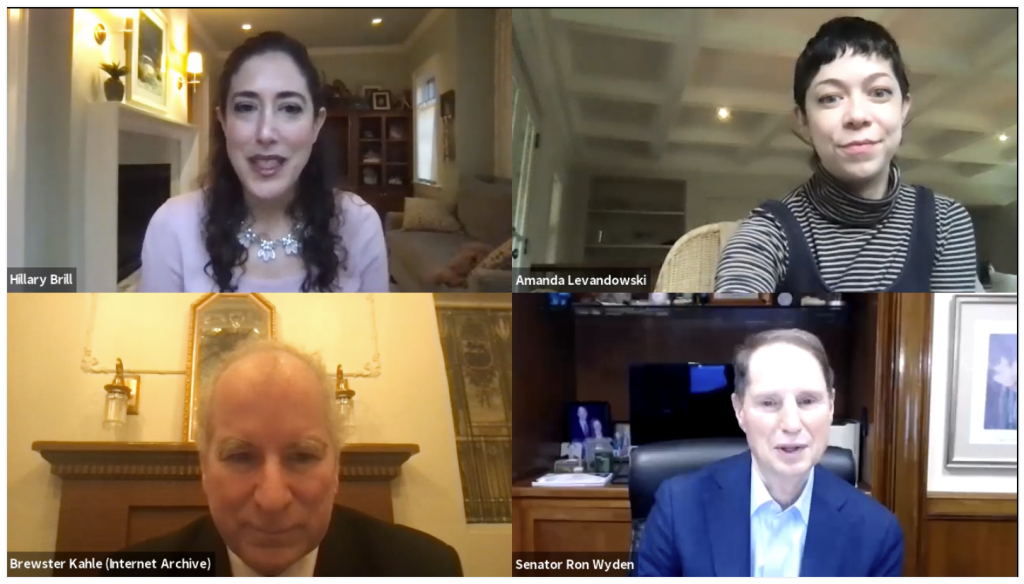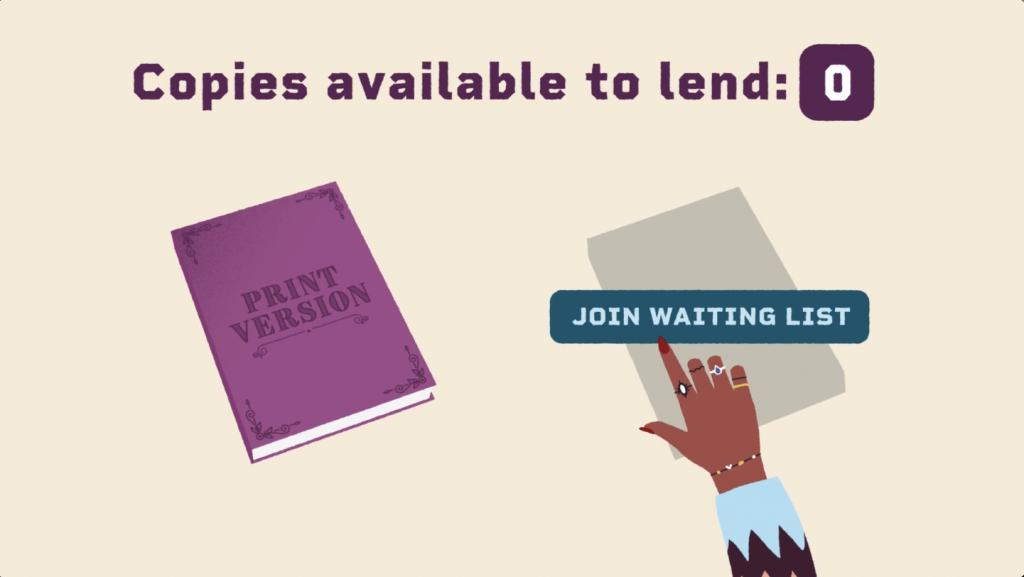
At an event discussing disinformation and the digital divide, U.S. Senator Ron Wyden from Oregon said he was committed to supporting a balanced copyright system that promotes fair use, digital lending, and the work of libraries.
“Libraries provide vital public services by making high quality resources available to everybody. And that’s true no matter what you’ve got in your bank account or your zip code,” said Wyden, noting he is the son of a librarian. “If the system is filled with draconian copyright laws and digital restrictions that make it hard for real news to be read, shared, and discussed, that particular vacuum is filled with more misinformation and lies.”
Wyden’s remarks were part of the webinar, Burying Information – Big Tech & Access to Information, sponsored by the Institute for Technology Law & Policy at Georgetown University, Public Knowledge and Library Futures on March 24. A recording of the event is now available.
Big special interests have always pushed for tighter restrictions on content, Wyden said, and now powerful corporations are trying to get a tighter grip on the internet. He cautioned that the proposed Digital Copyright Act is not the answer, saying he would fight for more balanced intellectual property laws and support libraries to provide easy, free access to reliable information from trustworthy sources.
“We’re seeing a change in the environment, which means you still need a card to get access to books, but it’s no longer a library card, it’s increasingly a credit card.”
Heather Joseph, Executive Director, SPARC
“We want a game with many winners. We want to have many authors, publishers, booksellers, libraries—and everyone a reader,” said Internet Archive Founder Brewster Kahle at the event. “The only way to do that is to have a level playing field that doesn’t have monopoly control.”
The pandemic has underscored the need for digital content to be readily available to the public. Libraries should be able to lend and preserve just as they have with print materials for years, however, many large publishers refuse to sell e-books to libraries and instead have restrictive licensing agreements.
“We’re seeing a change in the environment, which means you still need a card to get access to books, but it’s no longer a library card, it’s increasingly a credit card,” said Heather Joseph, executive director of SPARC, a global advocacy organization working to make education and research open and equitable by design for everyone. “We really need interventions that work to combat that shift, to flip that dynamic.”
To expand access to knowledge, Internet Archive has been digitizing the materials and respectfully lending them one copy at a time through Controlled Digital Lending (CDL) since 2011. The widespread practice is embraced by more than 80 libraries as part of Internet Archive’s Open Libraries program, and is growing across the country in various implementations elsewhere as demand increases.
“If you actually take a look at how [CDL] operates, the lending function is really no more and no less than what libraries are able to do in print. It’s just changed formats,” said Michelle Wu, an attorney and law librarian who pioneered the concept of CDL. The practice can serve people who aren’t able to physically get to a library because they live in a rural area, have a disability that limits transportation, work odd hours, are ill or quarantined during a pandemic. Libraries want to reward authors for creating their works, but also ensure the public has access to those works, Wu said.
It would be a better use of public funds for libraries to be able to purchase ebooks, rather than paying repeatedly for licensing fees, said Wu. Also, a library that digitizes its collection ensures access in an emergency, such as a pandemic, and preservation in the case of a natural disaster, saving the government money in having to replace damaged materials.
To counter disinformation, the public needs reliable information—and libraries are at the center of this battle, said SPARC’s Joseph.
“We can’t amplify content that we can’t access. And that’s really at the root of what libraries do for society,” Joseph said. “We’ve always been the equalizer in providing access to this high-quality information.” Rather than libraries being a trusted and critical distribution channel, they are being treated by publishers as adversaries, which Joseph said is a dangerous trend.
The discussion touched on a variety of remedies including legislative protections to enshrine practices like CDL, antitrust regulations, and building market competition. The work of Library Futures was highlighted as an avenue for concerned citizens to raise their voices and panelists underscored the need for action that reflects the best interest of the public.
“This is not just an inconvenience, it’s not just an additional expense to us as consumers. It’s creating an enormous divide in who can access critical knowledge,” Joseph said of publishers’ actions to restrict access to digital content. “The right to access knowledge is a human right. And a world in which one player—or worse a company—decides who’s in and who’s out is unacceptable.”

Problems with digital and the egregious business models.
I was worried after seeing an article that Adobe decided to go subscription-only on their software suite (like photoshop), that a trend that shows the consumer’s right are deteriorating as companies and their business models evolve. From a purchase[1], to a perpetual license[2], to a subscription[3]. This was a warning sign of the future.
[1] Often on physical goods.
[2] Perpetual license are often a one-time payment, and always cannot be terminated by the actual owner of the software when the user complies to the terms, therefore the holder cannot arbitrary kick someone out.
[3] A subscript is any form of recurring payment for continued access. Either to access a service, or a collection of content like streaming services. The holder has the most control, and can arbitrary kick someone out.
“Big special interests have always pushed for tighter restrictions on content, Wyden said, and now powerful corporations are trying to get a tighter grip on the internet.”
The EFF have been saying this on two articles:
– https://www.eff.org/deeplinks/2009/10/its-my-browser-and-ill-auto-click-if-i-want
– https://www.eff.org/deeplinks/2020/11/once-again-facebook-using-privacy-sword-kill-independent-innovation
The internet is not television, neither should it be. Television is the defining trait representing a monopoly on the user’s experience, because in the television world, they have control:
-You cannot watch a given episode of a show or movie wherever and whenever you want. You cannot pause a show and watch later, or replay, for example, and that cable is restricted in certain areas, not to mention region licensing.
-Your only ability is to change the channel or turn off the TV.
Trying to fix the internet piracy problem by making laws more draconian is like a person who have cancer or other health issues to consume a pill the person believes would resolves the cancer issue. But that medicine may not work, and worse may have side effects. On the internet, this can lead to sites that clearly have no intentions for piracy be shut down and pirates, as always evasive as ever, will try to avoid such automated system.
You really can’t make it “stay down”, as shown during that DeCSS and the AACS encryption key controversy, as well as malware makers, try to obfuscate the data (software, image, or anything that is digital), using steganography, encryption, and any other means of transforming the content to avoid detection. How are humans supposed to know that an uploaded content is forbidden to be posted? Plus content moderation at scale, as always, impossible to do.